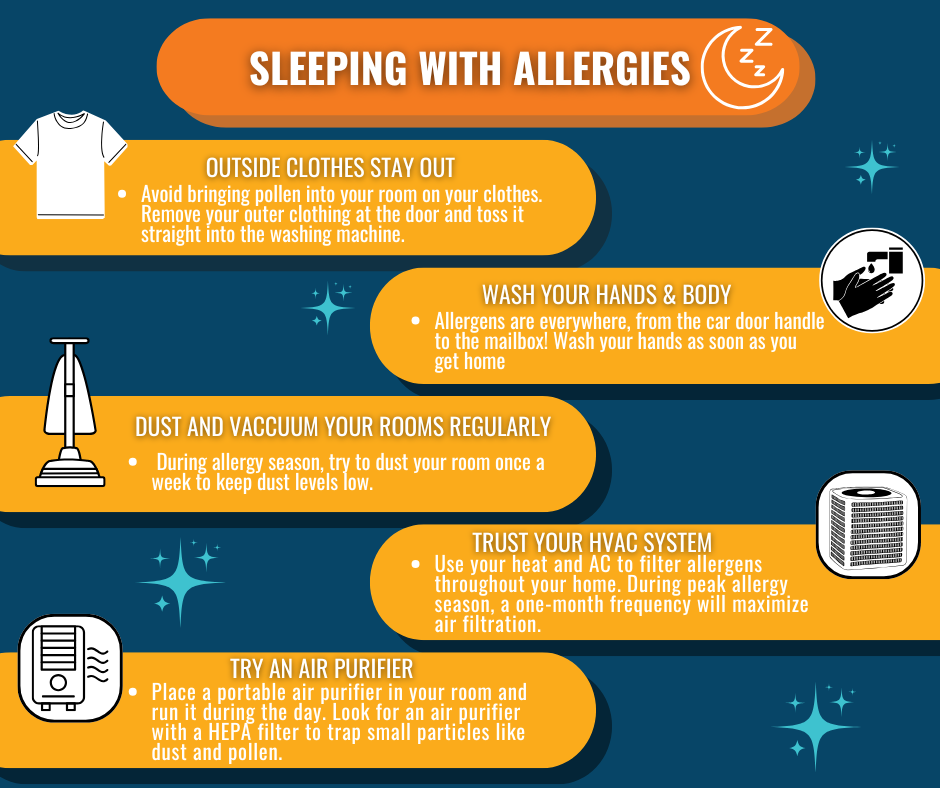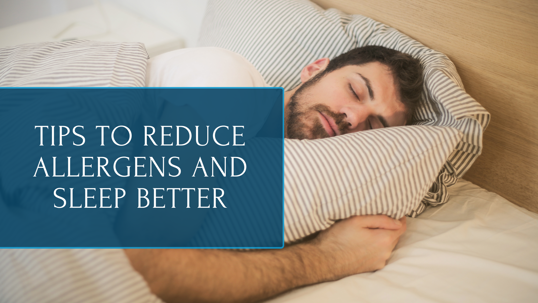While creating a completely allergy-free home is impossible, you don’t have to suffer while you sleep. There’s no need to live in a bubble during Greensboro’s lengthy allergy season. Regularly cleaning your home and maintaining a well-functioning HVAC system can improve your sleep despite your allergies.
Discover tips on managing allergies and enjoying a good night’s sleep in north-central North Carolina with helpful advice from The Plumbing & Air Service Co.
Common Causes of Bedroom Allergies
Seasonal allergy sufferers dread the spring bloom, summer’s hay fever, and fall mold. Roughly a quarter of US adults have seasonal allergies, including tree and grass pollen, ragweed, and mold spores.
Inflammation caused by seasonal allergies can increase your sensitivity to year-round indoor allergens like dust, pet dander, or mold. Many adults are allergic or sensitive to multiple allergens, which means you might continue to experience symptoms at night, even after seasonal allergies have ended.
Read more: How to Improve Indoor Air Quality at Home

How to Sleep Better with Allergies
If your allergies prevent a good night’s sleep, try these tips to catch some shut-eye.
- Outside clothes stay out – People with severe allergies should avoid bringing pollen into their bedrooms. When you get home, remove your outer clothing at the door and put it in the washing machine.
- Use your HVAC system – Your HVAC system will help to filter the air as it heats or cools your home. Be sure to replace your HVAC air filter every one to three months, aiming for once a month during allergy season. Check your owner’s manual or contact The Plumbing & Air Service Co for HEPA filter compatibility.
- Try an air purifier – Place a portable air purifier in your room and run it during the day. Look for an air purifier with aHEPA filter to trap small particles like dust and pollen.
- Wash your hands and body – Allergens are everywhere, from the car door handle to the mailbox! Wash your hands as soon as you get home, and avoid touching your mouth, nose, and eyes until your hands are clean. If you’ve spent much time outside, shower to remove allergens from your hair and skin.
- Dust your room regularly – Bedrooms tend to gather dust fast because of how much time we spend in them. Poor air circulation and closed windows also contribute to dust accumulation. To prevent buildup, dust your bedroom at least once a week.
Does Sleeping with a Humidifier Help Allergies?
Sleeping with a humidifier may alleviate symptoms for some individuals, but it’s far from a universal solution. High humidity levels may worsen allergies, especially for people sensitive to mold and dust.
Allergies and Sleep: Why It’s So Hard to Get Shut-Eye
You might notice your symptoms are worse when you sleep. Allergies tend to be more severe at night due to the increased exposure to bedroom allergens, including skin cells and hair, plus your body’s elevated histamine levels at night. For some individuals, lying down can exacerbate symptoms due to airway anatomy.
What Is the Best Temperature and Humidity for Sleeping?
The ideal temperature and humidity for sleeping are 60-67 degrees Fahrenheit, and indoor humidity is 30% to 50%. This is the range recommended by the EPA. Keep your home within these ranges while regularly cleaning and maintaining the HVAC system. It’s the best way to sleep well despite allergies.
Contact Winston-Salem’s HVAC Experts
The Plumbing & Air Service Co. is your go-to HVAC contractor in Winston-Salem, Thomasville, and surrounding areas. Our skilled technicians will provide friendly, professional HVAC services to keep your home life running smoothly!
Contact us online or call 336-502-8540 to schedule an appointment today.

